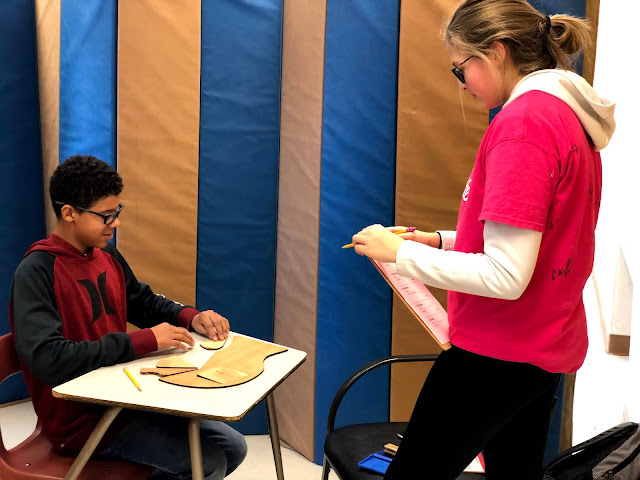KARCHER STAFF BLOG
2019-2020 Karcher Calendar
Facebook Page: https://www.facebook.com/KarcherMiddleSchool/
BASD Staff Blog: https://basdstaffnews.blogspot.com/
2019-2020 Karcher Calendar
Facebook Page: https://www.facebook.com/KarcherMiddleSchool/
BASD Staff Blog: https://basdstaffnews.blogspot.com/
______________________________________________________________________________
Kudos
____________________________________________________________________________________________________
- Kudos to all of our staff as everyone came in on Monday and Tuesday (March 16 & 17) eager to figure out this new world of education we are currently in at this time, moving to virtual learning.
- Seriously... everyone was amazing and very thoughtful and offering ideas throughout our time together to ensure all of our students have the technology along with materials and supplies they need to work from home.
- You all did an amazing job putting together thoughtful lessons during week one and the feedback from Karcher students and families was that they work load felt pretty appropriate when we are striving for about 3 hours of work per day for students (20-25 minutes of work per class).
- Kudos to Jack Schmidt for surveying his classes to see how they are doing after week one of virtual learning.
- This is a great way for us to gain feedback from our students so that we can tailor our work load to meet our students needs.
- It will continue to be a world of tweaking and adjusting as we strive to provide students with the Essential Skills and related outcomes as if we were still at school with them.
- Thank you to Molly Ebbers and Suzanne Dunbar for your time looking for additional resources and tools for staff and students! All of these have been linked to the first page of our Karcher Calendar, so that, if you are looking for additional support or ideas you know where you can look!
- If anyone else comes up with some great tools that could assist others, please refrain from sending an email to all staff with the information and send it to myself or Annie. We will then add it as a link on the first page so that staff know where they can go if they are looking for any help! As we all know, to many ideas and information coming at us all at once can be daunting! So... to streamline things please send it to Annie or I... or to Suzanne and she can also add things to the library link on the Karcher Calendar.
- Thank you to our BLT staff who have come together twice now, once over spring break, to talk through a few things to ensure we really do what is best for students and staff at Karcher! Thank you all for our time, thoughts, and ideas! It is cool to see the full team come together at a moments notice! Thank you!
"Article" this week: Relating to Google Meets for BASD.
Please read THIS document as it is the important information to be thinking about IF you are wanting to use video conferencing... this is a working document and may be subject to change, written by Scott Christensen. Know that these pieces of information from Scott/BASD are here to protect you and students!
______________________________________________________________________________
Please read THIS document as it is the important information to be thinking about IF you are wanting to use video conferencing... this is a working document and may be subject to change, written by Scott Christensen. Know that these pieces of information from Scott/BASD are here to protect you and students!
______________________________________________________________________________
Information/Reminders
__________________________________________________________________________________________________________________________
New Construction Information
- Click HERE to access the new building blog!
- We did meet this past Thursday, March 26th!
Important information:
- 3rd term information:
- Term 3 will be ending, as we shared when we saw you last, on March 13. Everything entered after March 13 will count for term 4. This went to the board and was approved as well for K-12.
- Make sure you post grades for term 3 by April 3 at 3:00!!!
- 4th term information:
- As a school district we have decided to go with pass/fail for term 4.
- When talking with BLT about this the consensus was to continue to enter grades into Skyward as you would as that feels "normal" to students and gives them more feedback as to their level of understanding. It also is what staff are used to doing as well.
- The "why" for pass/fail is to ensure we take some pressure off of chasing a grade when students are in a new world of learning. We want students to simply focus on learning and not worry about their final grade! So... please ensure you assist any students/families that are concerned about their students grade by sharing that we are intentionally going pass/fail to take the pressure off of "the grade" and keep the focus on "the learning".
- You might ask... so what will it look like at the end of the term... the answer... we will figure it out when we get there!
- Video conferencing with students:
- It was clear across the district that staff were wanting the ability to video conference with students, therefore, staff are able to use Google Meets ONLY at this time with students.
- Just because you can use Google Meets does not mean you have to use Google Meets with students. The expectation to use it is simply... not there.
- We did create THIS schedule for Google Meets as we want to make sure staff do not overlap on the times they are on Google Meets with students, the overlap could cause students to feel stressed out so we will not be overlapping any Google Meets. Therefore, please use this schedule to put yourself down if you are wanting to use Google Meets.
- The video conferencing schedule is also linked on the Karcher Calendar (first page) for this week and the following week. We will evaluate as we go and perhaps change if needed but want to try this for at least this week and potentially keep it the same the following week. Will talk with teams/BLT throughout the week to see how it is going.
- Also... there are two ways BLT saw the use of Google Meets... we are sure there are others:
- One... giving new instruction.
- However, it was also decided that you would need to screencastify this as you cannot have the expectation that all students will be available at the time you are giving the new instruction. By recording, students will have the ability to watch when they can.
- Two... clarify or answer questions.
- This could be a good way for students to have some "face to face" interaction with you in order to understand what they are learning.
- Josh Dow did email out how to set up a Google Meet ahead of time. I added that link to the Karcher Calendar (left side). Again... this would need to align with the video conferencing schedule.
- And... please make sure you talk with students about properly using Google Meets! Before using Google Meets please make sure you read the "article" document above from Scott Christensen. Not like this video...
- Team Meetings:
- Annie and I will meet with all teams throughout the week. I did add a time slot for interventionists/ESL.
- Please look at the team meeting schedule to know when your team/you are needed.
- BLT... we will continue to hold meetings, weekly, after we have our district meetings. I will send an invite for each meeting. I don't want to have a set date because our district meetings are not usually set.
- Again... see Karcher Calendar for team meeting document.
- Needed items at Karcher
- If you are in desperate need to get any items from Karcher please text or email me and we can set up a very brief period of time for you to come and get something. This is not a desired task within the district, especially with the "safe at home" order.
- Materials for students starting April 6
- Because we had initially planned to be virtual through April 3 we understand you did not make plans farther out than April 3.
- If there are items you would need copied or picked up by students please add your name and materials needed to this document. (as always... on the Karcher Calendar)
- Also... think of items that may be needed from April 6 through April 24 to limit the necessary times for pick up, etc.
- If you think you need to add information to the document have at it! I simply created "something" to get an idea of what is needed. If the table doesn't make sense to you to put your needs down then add your needs however you see fit to the document! Just trying to keep it all in once place versus keeping track of emails from staff.
- This will help us have a better understanding if there is anything at all from Karcher staff that needs to get to students.
- Annie and I will have a better feel of the students who are not engaging and what their needs are once we make contact with them this coming week. It may be where only a few students need copies of things due to a lack of internet access, etc. Be thinking about which students that might be and what they might need.
- It is not something that is expected. The more we can stay virtual with less need to coordinate pick ups and drop offs the better! But... if there are things needed we can take care of the copying, etc at Karcher to ensure minimal staff are in the building.
- Pictures of our story...
- As we work through this week please capture any moments in time that could show the work our staff and students are doing! It would be great to have the ability to continue to post the awesomeness of Karcher!
- Send anything you capture to me and I will post it!
- I did talk with Annie as well about continuing The Medal of Awesome throughout this time frame. So... if you have it please nominate a student and perhaps do a Google Meet so that you and the student show up on your computer to take a screenshot (command - shift - 4). Or think of another way to get a picture of the student "by" you! If you know who has it because you gave it to them last please reach out to them to continue the awesomeness!
- Let's continue to show what we do even through virtual learning!
- District things to know...
- Please continue to pay attention to the updates/emails from Dr. Plank. One really awesome thing noted in the updates is that all staff will be paid throughout the public emergency!
- This is one example of why BASD is awesome! And... our board is showing their support of all staff within BASD, simply awesome!
- So... keep paying attention to the updates!
______________________________________________________________________________
Pictures...
_____________________________________________________________________________________________________
Hopefully we have pictures to post for next week's blog!





















